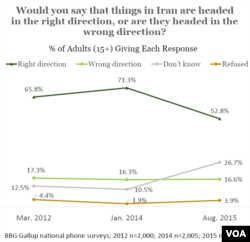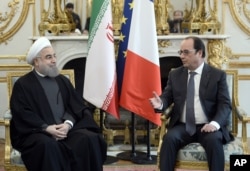Iran is back in business again after years of sanctions that wreaked havoc on the country’s economy.
Polls taken over recent months suggest Iranians felt better about the future of their country as sanctions began to be eased, but their confidence seems to be slipping of late. According to analysts, Iranians are still uncertain about specifics of the nuclear deal and whether the U.S. will live up to its end of the bargain.
The Gallup organization has since 2012 been tracking public opinion in surveys of Iran for the Broadcasting Board of Governors, which oversees VOA.
With the adoption of a joint plan of action in Geneva in early 2014, the U.S. and EU began easing up on sanctions, and Gallup conducted a phone survey of more than 2,000 Iranians, asking them whether they thought things in Iran were headed in the right or wrong direction. More than seven in 10 respondents said they thought Iran was headed in the right direction.
But in July 2015, after the final nuclear deal was announced, Gallup posed the same question to Iranians – and got a very different answer: Only a slight majority of respondents – 52.8 percent – thought Iran was heading on a positive path.
Today, sanctions have been lifted and $100 billion in frozen assets has been released. Iranian President Hassan Rouhani has traveled to Europe to negotiate multi-billion-dollar deals with France and Italy. A new poll by the University of Maryland’s Center for International and Security Studies (CISS) shows Rouhani still has strong public support ahead of parliamentary elections February 26.
Fuzzy on nuclear pact details
“I question these polls, whether somebody is going to be completely candid, especially if they get a phone call - maybe from outside Iran, from someone they don’t know - I think they would tend to be more supportive of the government perhaps than they would otherwise be,” said Barbara Slavin, acting director of the Future of Iran Initiative at the Atlantic Council in Washington. “I think you have to always have that caveat.”
Sanctions have cost Iran more than $160 billion in oil revenues since 2012, and shrunk the country’s economy by as much as 20 percent. Slavin says Iranians were hopeful the economy would turn around once former president Mahmoud Ahmadinejad left office.
Hassan Rouhani was elected president in 2013 on campaign promises to “save the economy, revive morality and interact with the world.” A Zogby poll at the time showed that 43 percent of Iranians expected life to improve under the new administration. And they supported the nuclear talks as a means of getting some sanctions relief.
But now that a nuclear deal is in place, Iranians aren't quite clear on the details, according to Payam Mohseni, Iran project director at Harvard’s Belfer Center for Science and International Affairs.
“Iranians, based on how Rouhani sold the nuclear deal domestically, are not really aware of the exact terms of the agreement,” he told VOA via Skype. “They do not think that Iran has really retracted or limited much of its nuclear program. And they believe that all U.S. sanctions will be removed. So there are many minutiae of the deal that Iranians are not aware of.”
The CISS poll confirms all this, and it also found that a growing majority mistakenly believe the International Atomic Energy Agency won’t be allowed to inspect Iranian military sites.
Iranians also are uncertain that the United States can be trusted. Sixty-two percent of Iranians polled by CISS say they are not confident Washington will honor its obligations under the nuclear deal that was implemented January 16.
“We have to understand that Iranians follow our politics very closely,” the Atlantic Council’s Slavin told VOA. “And all the comments, particularly from Republican presidential candidates, have had an impact. It’s very unsettling to hear that so-and-so would tear up the nuclear deal the day after he takes office. And that certainly has had an impact on their thinking.”
Hoping for real change
Significant as it is, the nuclear deal takes a backseat to more pressing concerns in Iran – like a sluggish currency and widespread unemployment.
On February 26, Iranians will vote in parliamentary elections to determine their country’s political future. Six in 10 Iranians hope that Rouhani supporters are elected – and only four in 10 assume the vote will be “somewhat free and fair.”
Polls suggest the nuclear deal won’t be a top priority to voters.
“Now that the deal has been made, now that Iranians see the president, the foreign minister, traveling to Europe, making all these trade agreements, they want to see real change economically on the ground and in their lives,” Mohseni said. “Whether Rouhani can deliver in this field is still to be seen.”








